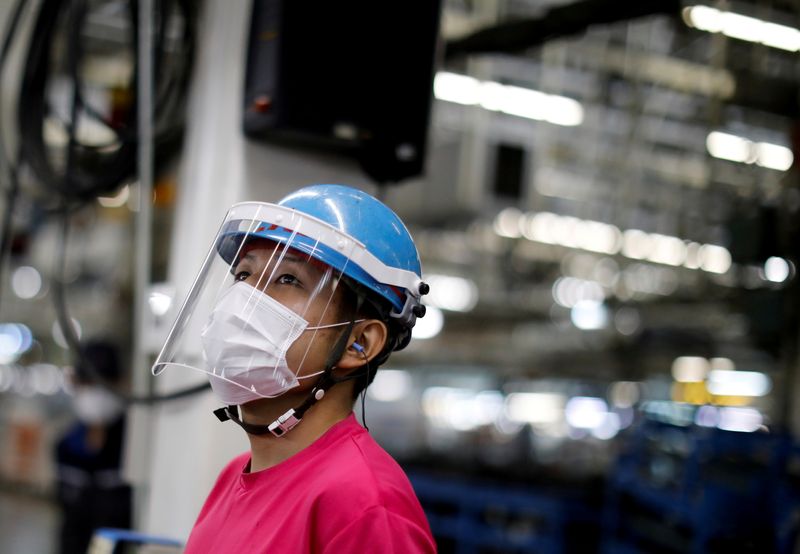By Lucia Mutikani and Jonathan Cable
WASHINGTON/LONDON (Reuters) -Manufacturing activity across the United States, Europe and Asia contracted again last month, underscoring the fragility of the global economic recovery, although factories in the euro zone at least may have passed the trough, surveys showed on Wednesday.
The latest figures come as central bankers gear up for another round of interest rate increases to combat high inflation. The U.S. Federal Reserve looks set to hike borrowing costs by 25 basis points later on Wednesday while the European Central Bank and the Bank of England are both expected to add 50 basis points on Thursday.
The Fed's fastest interest rate-hiking cycle since the 1980s has stifled demand for goods, which are mostly bought on credit. U.S. manufacturing sunk further in January with the Institute for Supply Management (ISM) reporting its manufacturing Purchasing Managers' Index (PMI) dropped to 47.4 from 48.4 in December.
The third straight monthly contraction pushed the index to the lowest level since May 2020 and below the 48.7 mark viewed as consistent with a recession in the broader economy. A PMI reading below 50 indicates contraction in manufacturing, which accounts for 11.3% of the U.S. economy.
The dollar's past appreciation against the currencies of the United States' main trade partners and a softening in global demand are also hurting manufacturing in the world's largest economy.
"It looks like we will continue to see headline contraction in the manufacturing sector for several more months, at a minimum," said economists at Jefferies in a note to clients following the survey's release.
But the combination of better supply and ebbing demand has resulted in a significant slowdown in consumer and wholesale inflation, with outright declines in monthly goods prices.
Despite demand being under pressure, U.S. factories are also holding onto their workers, for now. The ISM survey's measure of factory employment dipped marginally to 50.6 from 50.8 in December.
EURO ZONE REBOUND, ASIAN STRAIN
Elsewhere, price pressures slackened and a fall in demand moderated in the 20 countries sharing the euro, driving a surge in optimism. The euro zone eked out growth in the final three months of 2022, managing to avoid a recession, official data showed on Tuesday.
S&P Global (NYSE:SPGI)'s euro zone final manufacturing PMI climbed to a five-month high of 48.8 in January from December's 47.8, in line with a preliminary reading but still below the 50 mark separating growth from contraction.
"We think in general the worst is now past for both inflation and the activity front. The activity is not softening, it is going back up, so expectations are for a rebound," said Mateusz Urban, a senior economist at Oxford Economics.
Manufacturers in Germany, Europe's largest economy, started 2023 with a slightly brighter outlook on the year ahead despite demand continuing to fall as inflation and supply chain problems eased.
In France, the bloc's second-biggest economy, factory activity returned to growth albeit not as strongly as initially forecast.
But British manufacturing business shrank for a sixth month in a row in January, kicking off a tough 2023 when the country's economy looks set to fall into a recession.
Easing price pressures will however be welcomed by central bank policymakers. Soaring inflation - initially described as transient - has proved far more sticky than thought and prompted aggressive monetary tightening.
Euro zone inflation eased for the third straight month in January but relief may be limited as underlying price growth held steady, official data showed on Wednesday.
In Asia, factory activity contracted in January as the boost from China's COVID reopening had yet to take full effect.
China's factory activity shrank more slowly in January after Beijing lifted tough COVID curbs late last year, a private sector survey showed.
China's Caixin/S&P Global manufacturing (PMI) nudged up to 49.2 in January from 49.0 in December, staying below the 50 mark for a sixth straight month.
The data contrasted with a better-than-expected official PMI survey issued on Tuesday. But whereas the official PMI largely focuses on big and state-owned Chinese businesses, the Caixin survey centers on small firms and coastal regions.
Softening input-price pressures also offered initial positive signs for Asia, with the pace of contraction in output slowing in Japan and South Korea, the surveys showed.
But there is uncertainty about whether the region can weather the hit from slowing global demand and stubbornly high inflation.
"The worst of Asia's downturn is behind, but the outlook is clouded by weaknesses in major export destinations like the United States and Europe," said Toru Nishihama, chief economist at Dai-ichi Life Research Institute in Tokyo.
Factory activity expanded in January in Indonesia and the Philippines but shrank in Malaysia and Taiwan, PMI surveys showed. India's manufacturing industry started the year on a weaker note, expanding at the slowest pace in three months.

The International Monetary Fund on Tuesday slightly raised its 2023 global growth outlook on "surprisingly resilient" demand in the United States and Europe and the reopening of China's economy after Beijing abandoned its strict pandemic controls.
But the IMF said global growth would still slow to 2.9% in 2023 from 3.4% in 2022, and it warned the world could easily tip into recession.
